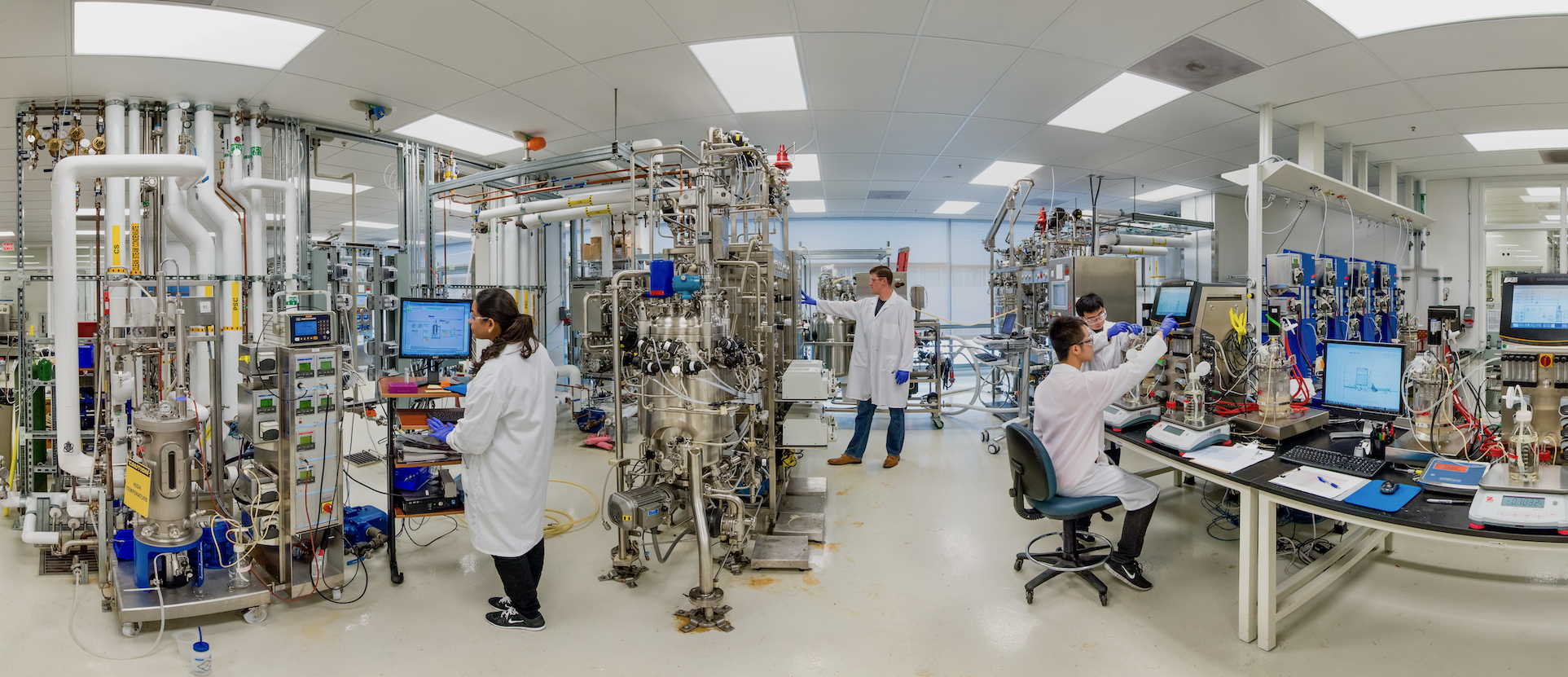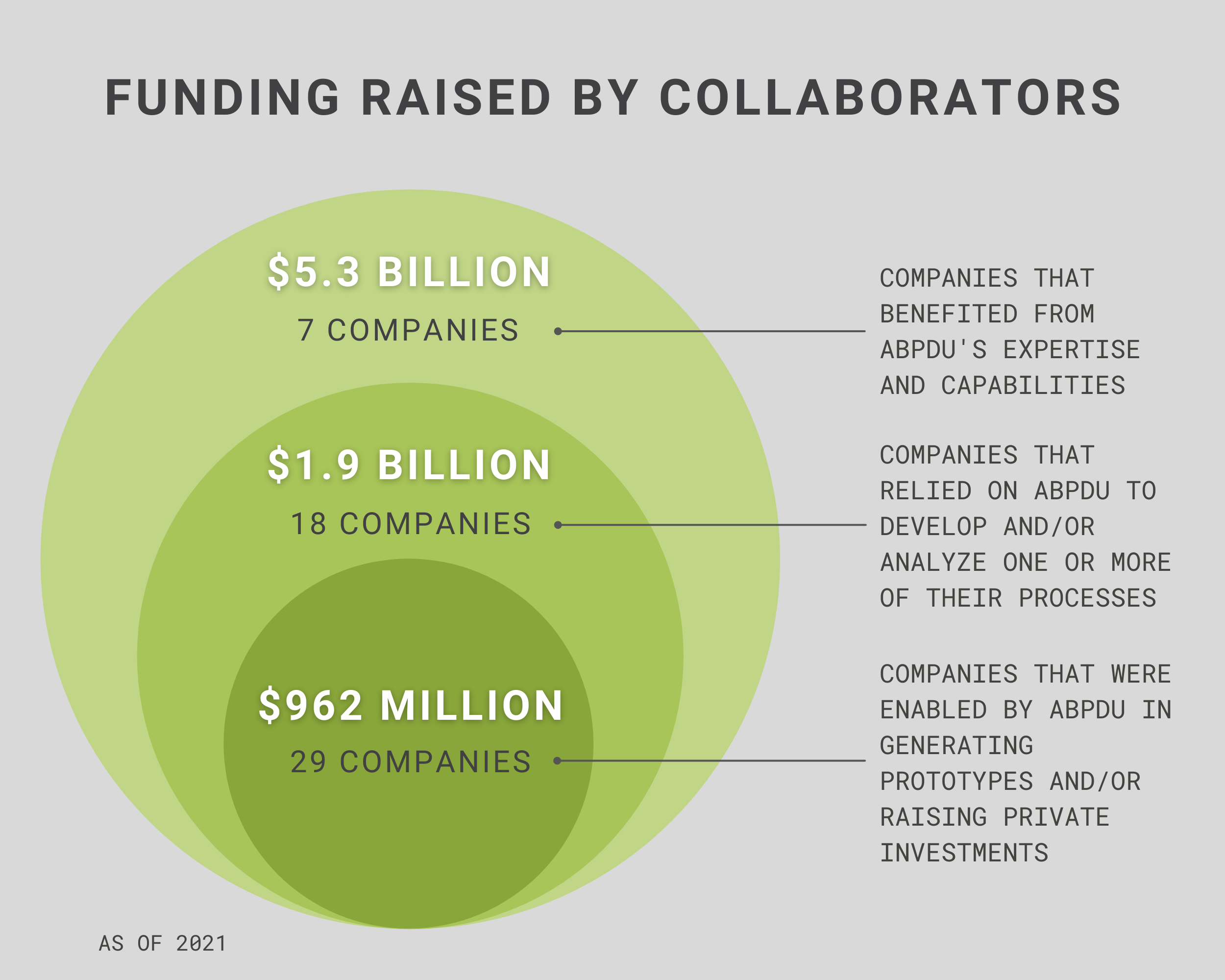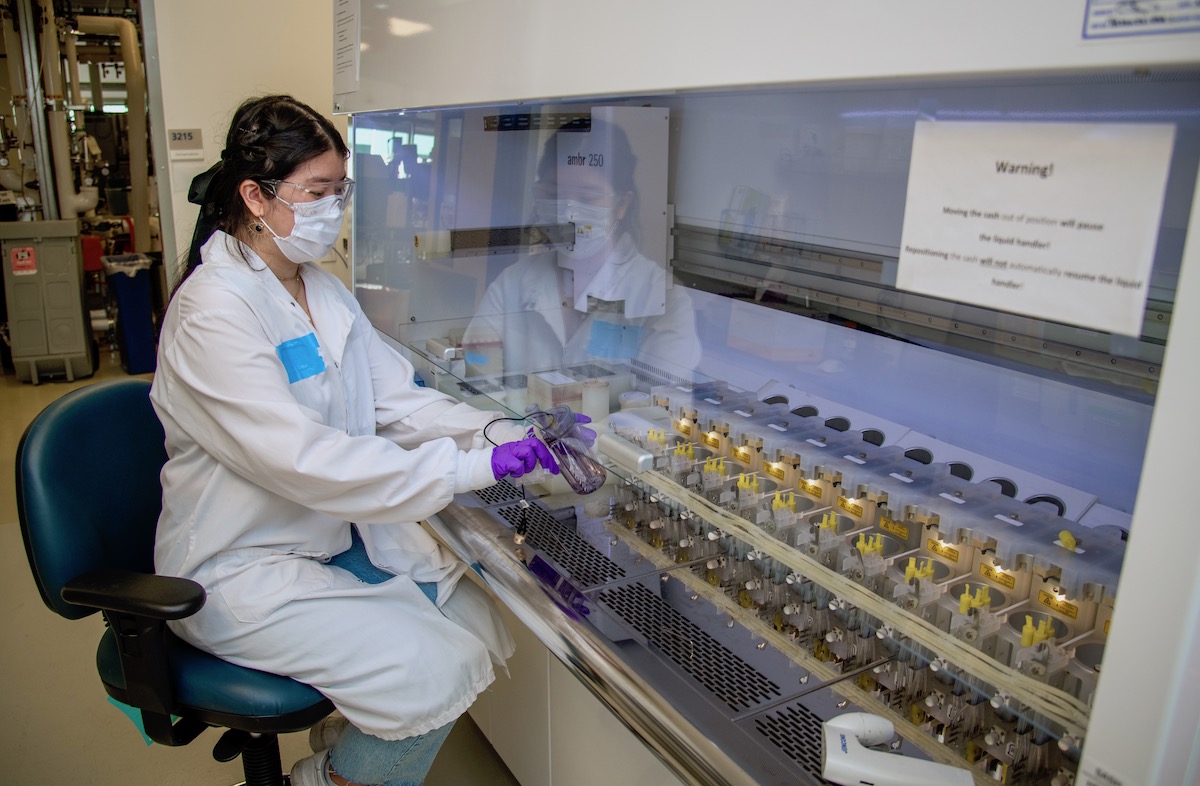
A panoramic view of laboratory space inside the ABPDU facility, located in Emeryville, CA. (Credit: Roy Kaltschmidt/Berkeley Lab)
-By Emily Scott
Ten years ago, Lawrence Berkeley National Laboratory announced the opening of a brand new, 15,000-square-foot facility full of stainless steel state-of-the-art bioprocessing equipment – what we now know as the Advanced Biofuels and Bioproducts Process Development Unit, or ABPDU, was officially open for business.
Funded by the U.S. Department of Energy’s Bioenergy Technologies Office, ABPDU set out to provide a boost to the development of advanced biofuels – renewable fuels that produce at least 50% less greenhouse gas emissions than fossil fuels. ABPDU’s facility would serve as an industry-scale proving ground for biofuel discoveries made at lab bench-scale.
At the same time, the world of biotechnology was booming. A wave of new startups emerged, aiming to use the power of biology to create sustainable, bio-based products to replace those made with fossil fuels. Over time, ABPDU evolved to meet the needs of this industry, collaborating with companies and academic partners developing various bioproducts that affect our everyday lives.
Building up the bioeconomy
Over the years, ABPDU has helped dozens of collaborators scale-up innovative biotechnologies and transition them to the marketplace – from skis made with algae oil and sustainable indigo dye to waste-derived biofuel precursors and even COVID-19 testing and treatment technologies.
By utilizing ABPDU’s capabilities, small companies and startups don’t have to spend time and money building up their own facilities. Instead, they take advantage of ABPDU’s equipment and expertise to prove their technologies can scale to an industry level and generate prototype materials – important milestones to demonstrate to potential investors.
ABPDU has served as a resource for the Department of Energy (DOE) Bioenergy Research Centers, which are research partnerships focused on improving and scaling up advanced biofuel and bioproduct production processes, and collaborated with over 65 industry partners. Many of these partners have set up their own labs or pilot plants, secured additional funding, and launched their own products as a direct result of working with ABPDU.

ABPDU has collaborated with over 65 industry partners, many of whom have gone on to secure funding from investors. For 29 of these companies, ABPDU was crucial to their success in generating prototypes and/or raising private investments. (Credit: Emily Scott/Berkeley Lab)
“Working with ABPDU to validate our company’s technology and bioprocess at the pre-pilot scale, along with generating samples, has directly contributed to an agreement with a large strategic partner and traction with investors,” said Harshal Chokhawala, CEO and founder of ZymoChem, a biotech company that collaborated with ABPDU to scale up the production of a chemical made from renewable sources.
Training the next generation of bioprocess engineers
Over the last ten years, ABPDU has also become a desirable place to train for future careers in the bioeconomy. Working at ABPDU has jump-started the careers of dozens of scientists and engineers of various career stages, and has also provided early hands-on experience for college and high school student interns. Several internship alumni and former employees have gone on to work in the biotech industry, stating that the learning opportunities and mentorship they received at ABPDU were key to their success.
“I can’t stress enough how special and unique ABPDU is,” said Hunter Zeleznik, a former research associate at ABPDU who is now a strain development fermentation research associate at LanzaTech. “To be immersed in that environment and be exposed to so many different things is so valuable.”
Currently, the biotech industry faces a pressing need for experienced people who can bring bio-based products to market. To help meet this demand, ABPDU and UC Berkeley collaborated on the creation of a new course that gives students hands-on experience with bioprocessing equipment, preparing them for careers in the biopharmaceutical, industrial biotech, or food tech industries.

Tiffany Chen, UC Berkeley chemical engineering student, loads a sample into the AMBR 250 device as part of UC Berkeley’s Advanced Bioprocess Engineering Laboratory class. (Credit: Thor Swift/Berkeley Lab)
Part of UC Berkeley’s Master of Bioprocess Engineering program, the course takes place at ABPDU’s facility, where ABPDU staff train students on how to use equipment and perform bioprocessing experiments.
“Students at most universities usually don’t have the opportunity to work with the larger-scale equipment that we have at ABPDU,” said Deepti Tanjore, director of ABPDU. “This course provides students with a unique learning experience that you won’t be able to find elsewhere.”
A bright, sustainable future
As the field of biotechnology continues to grow at a rapid pace, ABPDU plans to evolve and adapt to meet the needs of this industry.
“We are well positioned to be able to take on new challenges as the biotech industry continues to innovate,” said Tanjore. “We regularly gather feedback from our industry partners and work to respond to this feedback, providing services and resources that prevent them from re-inventing the wheel and help them succeed.”
The U.S. bioeconomy, which is centered around reducing our dependence on fossil fuels, is valued at nearly $1 trillion and is poised to grow substantially, said Mary Maxon, who recently began a professional leave of absence from her position as Berkeley Lab’s Associate Laboratory Director for Biosciences.
“Through collaboration with ABPDU’s uniquely trained staff, companies can de-risk, scale, and optimize new processes quickly and flexibly,” Maxon said. “As innovations such as recyclable carbon sources expand the range of possibilities for a future circular economy, ABPDU is an increasingly valuable partner to bring these opportunities to market.”
These innovations will ensure that ABPDU can assist in achieving the goals of the broader bioeconomy.
# # #
Founded in 1931 on the belief that the biggest scientific challenges are best addressed by teams, Lawrence Berkeley National Laboratory and its scientists have been recognized with 14 Nobel Prizes. Today, Berkeley Lab researchers develop sustainable energy and environmental solutions, create useful new materials, advance the frontiers of computing, and probe the mysteries of life, matter, and the universe. Scientists from around the world rely on the Lab’s facilities for their own discovery science. Berkeley Lab is a multiprogram national laboratory, managed by the University of California for the U.S. Department of Energy’s Office of Science.
DOE’s Office of Science is the single largest supporter of basic research in the physical sciences in the United States, and is working to address some of the most pressing challenges of our time. For more information, please visit energy.gov/science.